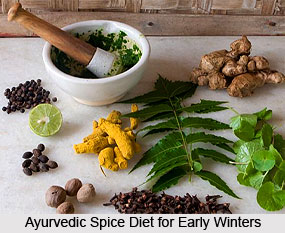 Ayurvedic diet for Indian seasons includes a healthy diet plan for all the Indian seasons, namely summers, monsoons, autumns, winters and springs. The science of Ayurveda teaches that right diet is the foundation of healing. This natural medicinal science emphasizes on the significance of a nutritious diet for maintaining the physical and mental stability of the human body, throughout the year. Seasonal ayurvedic diet is based on certain determinants like age, gender, immunity and various "doshas" which are associated with the potency of body tissues. With a tradition of more than 5000 years, Ayurvedic Diet is a holistic health treatment that includes; herbs, meditation, massage and yoga.
Ayurvedic diet for Indian seasons includes a healthy diet plan for all the Indian seasons, namely summers, monsoons, autumns, winters and springs. The science of Ayurveda teaches that right diet is the foundation of healing. This natural medicinal science emphasizes on the significance of a nutritious diet for maintaining the physical and mental stability of the human body, throughout the year. Seasonal ayurvedic diet is based on certain determinants like age, gender, immunity and various "doshas" which are associated with the potency of body tissues. With a tradition of more than 5000 years, Ayurvedic Diet is a holistic health treatment that includes; herbs, meditation, massage and yoga.
Ayurvedic Diet for Summers
Foods like milk, ghee, cucumbers, grapes, pomegranates, pears, plums, mangoes and several juicy fruits form the ideal ayurvedic diet for Indian summers. Dairy products, particularly derived from cow"s milk are healthy for the Pitta. Cool beverages like buttermilk, coriander herbal teas and others should be consumed in summers. The summer season or the "Greeshma Ritu" is the peak of the Pitta aggravation. It is extremely hot during this point of the year and therefore a shift from the regular diet is desirable. Black Tulsi seeds, rose petal jams and salads include the other types of ayurvedic diet. Ginger, black pepper and other hot spices should be eliminated from the diet.
Ayurvedic Diet for Monsoon
 Since monsoons are humid and soggy, food grains like wheat and barley, along with butter, ghee, milk and honey would be the appropriate diet for monsoons. During this season, Ayurveda advises to bring about a moderation in all aspects of life including diet. Hot baths and showers are advised and it should be taken after an oil massage. All kinds of junk food, salads and heavy oils like mustard oil, other heating oils and peanut oil should be avoided during this wet season. The humidity weakens the digestion in this season and exacerbates the vata and creates "Ama" or food that is not digested properly. Therefore cheese, curd and peas should never be consumed. It is advisable to drink only lukewarm water.
Since monsoons are humid and soggy, food grains like wheat and barley, along with butter, ghee, milk and honey would be the appropriate diet for monsoons. During this season, Ayurveda advises to bring about a moderation in all aspects of life including diet. Hot baths and showers are advised and it should be taken after an oil massage. All kinds of junk food, salads and heavy oils like mustard oil, other heating oils and peanut oil should be avoided during this wet season. The humidity weakens the digestion in this season and exacerbates the vata and creates "Ama" or food that is not digested properly. Therefore cheese, curd and peas should never be consumed. It is advisable to drink only lukewarm water.
Ayurvedic Diet for Autumn
"Sharad" season is a period of transition from Pitta Dosha to Vata Dosha. Bitter, sweet and lighter foodstuffs should be consumed in Indian autumns. Wheat, ragi and barley are the essential food grains which must be taken. Cooked apples, lemons, sweet potato, almonds, butternut squash, ghee, beets and various kinds of vegetable soups should be consumed during autumn season. Throughout the entire day, one should consume lukewarm beverages. In this season, curds and fermented foods should be avoided. Foods, which are alkaline in nature like radish, salts, drumsticks and ginger, are not to be consumed. Vegetables like tomato, brinjals, ladies finger, chillies should also be avoided. Beverages containing sour fruits should also not be taken. Different preparations of soup, milk products, sugarcane and new food crops can be consumed as part of an ayurvedic diet during autumn.
Ayurvedic Diet for Early Winter
People must drink lukewarm water during early winters. There are certain foods, which should not be consumed during the early winters like one should avoid dry, cold, light food in excess. Foodstuffs with pungent, bitter, and astringent tastes should be avoided in excess. Spices like black pepper, turmeric, cinnamon and cloves should be taken. Herbal formulas for curing some winter ailments like cold are Chyawanprash, Talisadi and Sitolpadi should be consumed.
Ayurvedic Diet for Spring and Late Winters
Wheat, barley, rye and millets are the various food grains which must be consume during spring season in India. Ayurvedic diet comprises a Kapha pacifying diet. Spring is the season of life, prosperity and richness. During this season, the accumulated kapha is aggravated due to the heat of the sun. Oily food, junk food, bitter or pungent food should never be taken during this season.
During the "Shishir Ritu" or the late winters, oily fresh and warm food should be eaten. Only vegetarian foodstuffs would include a healthy Ayurvedic diet during late winter season in India.
Generally, Ayurvedic diet comprises seasonal foodstuffs. For instance, one must consume leafy, green vegetables like squash, pumpkin, beans and others in summers which cool the body and balance "Vata", while during winters, hot spices like turmeric, black pepper, cloves and cinnamon should be consumed. Following a seasonal Ayurvedic diet is considered a healthy practise as one can be free from several seasonal ailments.





